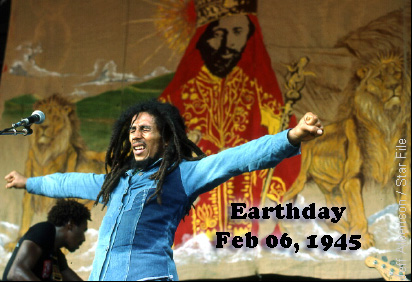
[et_pb_section fb_built=”1″ _builder_version=”3.29.3″][et_pb_row _builder_version=”3.29.3″][et_pb_column _builder_version=”3.29.3″ type=”4_4″][et_pb_image src=”http://designerofreality.com/wp-content/uploads/2019/10/bob_marley_madison_sq_garden.jpg” _builder_version=”3.29.3″ box_shadow_style=”preset2″ align=”center” hover_enabled=”0″][/et_pb_image][/et_pb_column][/et_pb_row][et_pb_row _builder_version=”3.29.3″][et_pb_column _builder_version=”3.29.3″ type=”4_4″][et_pb_text _builder_version=”3.29.3″ hover_enabled=”0″]
Bob Marley: A Reluctant Messiah
Marley was born February 6, 1945 in rural St. Ann’s Parish, Jamaica; the son of
a middle-aged white, British father and a local teenaged black Jamaican mother. Bob had little exposure to his father but got loving care from his mother Cedella and his Grandfather Omariah who was known as a kind of shaman or medicine man and had considerable influence on the young Bob. Omariah had quite a bit of land in the Nine Mile high country and young Bob would do chores for his grandfather, fetching water and working with the livestock.
His life would change dramatically when at the request of his father Bob would be forced to leave his beautiful Blue Mountain country home environment and the protection of his grandfather to go to Jamaica’s largest city which was the capital of the island. He was only five when his father, who he seldom saw, would take him to Kingston supposedly to go to school. Whether school had actually been the plan or not, it never happened and his father ended up apparently abandoning him on the streets of the city. Luckily someone reported to his mother back in Nine Mile that Bob had been seen wandering the streets of Kingston’s Trenchtown area. Luckily he had come through his time in the city without physical harm but it must have been a very scary time for the five year old. He would be returned to the life and protection provided by his grandfather, mother and friends until he was 12. This time it was his mother who decided to move to Kingston. She would move in with the father of Bunny Livingston, a good friend of Bob’s and one of the future Wailers.
Bob did not have an easy time in Kingston and probably felt like an outcast as his light skin made him neither black nor white in the society he found himself. To learn more about how Bob’s story developed, I highly recommend getting Roger Steffens’ book, “So Much Things to Say” where Roger gets first hand information from most everyone that was associated with Bob through his life. Most interesting from the perspective of this book is how, in what were often bad conditions, Bob consistently drew to himself the teachers and collaborators that were to make it possible for his dreams to fall into place. It is very clear that it was Bob’s passion and single minded belief in his mission that drove him ever forward and would eventually carry him to heights of social influence that few have ever reached as cultural figures.
I call Bob a “reluctant Messiah” because I believe he came here with some big plans and the intent of positively affecting our social order. Some of us come into this time space reality with some very definite intentions and Bob Marley is certainly one of those individuals. I don’t think it would be a stretch to say he picked the circumstances of his birth and early life to provide the tools and story he needed to accomplish his mission. His mission was tied right into the paradigm shift we have been talking about. He was part of that 1960’s – 1970’s incubator of social change. Half African roots and half Anglo-European genetic roots he was neither black nor white. Through his life he most strongly identified with his African roots because I believe he was here to be a part of putting racial discrimination behind us. Even though the island of his birth, Jamaica is a very culturally diverse society, the island only gained independence from British rule in 1962. For most of Bob’s teenage years the island was under colonial rule. Bob would record his first record, “Judge Not”, in 1963.
“Judge Not” would not become a hit at the time but the message of the song is quite prophetic. Bob had already been through a great deal going from bountiful country living surrounded by great natural beauty to living in the “Concrete Jungle” of Kingston’s Trenchtown. Even though he was a somewhat shy teenager according to those Steffens talked to in his book, Bob attracted the attention and help of people like Joe Higgs who would become a great mentor and the vocal coach for Bob and the future Wailers. When Bob wrote and recorded “Judge Not” he was only 18 years old but he was foreshadowing the spiritually based message that would take him to international recognition and to being a powerful force in positively transforming the world’s social reality. Like the Maharishi, he would become a force pushing us to new and brighter days. Here’s how Bob’s first song went…
Don’t you look at me so smug
And say I’m going bad.
Who are you to judge me
And the life that I live?
I know that I’m not perfect
And that I don’t claim to be.
So before you point your fingers,
Be sure your hands are clean.
Judge not
Before you judge yourself.
Judge not
If you’re not ready for judgement. Woah oh oh!
The road of life is rocking
And you may stumble too.
So while you talk about me,
someone else is judging you.
More than any other single artist, Marley demonstrates how powerful the impact of music can be. Bob was not churning out simply catchy tunes, he was delivering a philosophy of living. Most every song he wrote offered social commentary and encouraged people to never give up hope of better days coming. There is no question that Marley had little interest in fame and fortune other than as a means to advance his mission. He always believed his time was very limited. So much things to say…
Bob’s messages injected into modern society through the captivating qualities of his music continue to transform the world today. His humble beginnings and the struggles of his youth gave him the canvas to paint his message for those who needed it most. While for many, those conditions would have been viewed as a reason why they could never accomplish much in life – there was only poverty, fear and no hope for the future in the minds of many of Bob’s peers. Bob’s message was all about keeping hope alive – acknowledging the struggles but holding up a bright beacon of a better life for those who had hope and determination – “So while they fight you down… Stand firm and give Jah thanks and praises”.
This is a universal message and like the messages of all great Spiritual and cultural leaders, it was really all about the value and opportunity open to every individual. All one needed to do was allow themselves to dream and believe in the possibility of a better future. Bob arrived at just the right time. It was a time where because of the fight against oppression and racism that was building around much of the world, his voice was able to drive that process – so many were yearning for a message of hope and possibility that celebrated each of us as important individuals. The fact that he was becoming the first “third world” international super star made his message all that more powerful. The song “One Love” delivered the message possibly best of all. It was a message of Love and Faith surrounded with joyous uplifting music. A message routed in a Spiritual perspective: “Give thanks and praise to the Lord and I will feel all right; Let’s get together and feel all right.”
Another song that I feel stands out as greatly significant in his catalog of songs might be thought of as just a nice little upbeat tune but it offers some powerful programming for that bio-computer brain we have. The song is titled “Three Little Birds” and like a parable from the bible or other Spiritual text, it uses the three little birds as an example of correct living. The birds just are. They are living their lives and all is well. We have discussed how fear and worry are destructive emotions. The Law of Attraction is only going to give you more to fear and worry about if that is your focus. One of the most repeated messages in Jesus’ teachings is “fear not”. The repeated message of this song is “Don’t worry, everything is going to be alright.” It is the very essence of hope in a simple happy song. Because of the time and place and the available technology of the day, Bob Marley has been able to get this short and direct mental programming code into the hearts and minds of hundreds of millions of people reaching just about every corner of the planet. Let’s just hope a lot of people receive the message and take it to heart – it will make the world a better place.
The two songs, “One Love” and “Three Little Birds” really give you all the advice and vision one needs for a happy life. That is why I call him a reluctant Messiah. Bob Marley did not set out to be an international superstar. He just had a message to get out to the world and a passion to do as much as he could in what he seemed to know would be a short period of time. He survived an assassination attempt and extensive travels around the globe only to be brought down by an old injury to his big toe. It is kind of ironic that “stubbing your toe” a few times would bring the show to an end but that is basically what happened. The injuries eventually lead to cancer and by the time anyone really became aware of it, it was already too late to do anything about it. Probably more because of the encouragement of all those around him he tried to fight it. Both traditional and exotic treatments were tried to no avail and on May 11, 1981 at age 36 Bob Marley would die in route back to Jamaica. He would get a funeral and tributes suitable for a King but most important; his message like his Spirit would live on and continue to advance the positive evolution of consciousness and the perceptions about our lives in this world community.
Here are some final words of wisdom from Nesta Robert Marley:
“Unity is the world’s key, and racial harmony.
Until the white man stops calling himself white and the black man stops calling himself black, we will not see it.
All the people on earth are just one family.
Life…it’s life we deal with. No death.
He that sees the light and knows the light shall live. When the time comes, people will seek the truth in all things. They get it when they are ready to hear it.
Man can’t do without God.
Just like you thirsty, you have to drink water.
You just can’t do without God.
I pledged to work for righteousness.
God’s given me inspiration.
So me personally as a man is nothin’
without the inspiration of Jah.”
Bob Marley
From ‘In His Own Words’ compiled by Ian McCann (Omnibus Press 47052)
The final song on Bob Marley’s UPRISING album which was the last studio album released in his lifetime could not have been more fitting. It is called “Redemption Song”. Redemption can be defined as the action of saving or being saved from sin, error, or evil. Synonyms are saving and absolution. All of the lyrics from the song provide a powerful and very important final message from this reluctant messiah. If you are not familiar with the song, it is one that you should add to your playlist. At the very beginning of this book we quoted a couple of lines from the song. These words really encapsulate a central idea of this book:
“Emancipate yourselves from mental slavery
None but ourselves can free our minds”
[/et_pb_text][/et_pb_column][/et_pb_row][et_pb_row _builder_version=”3.29.3″ column_structure=”1_3,1_3,1_3″ hover_enabled=”0″][et_pb_column _builder_version=”3.29.3″ type=”1_3″][et_pb_image src=”http://designerofreality.com/wp-content/uploads/2019/10/MarleyTourPoster.jpg” _builder_version=”3.29.3″ align=”center” hover_enabled=”0″ box_shadow_style=”preset2″][/et_pb_image][/et_pb_column][et_pb_column _builder_version=”3.29.3″ type=”1_3″ hover_enabled=”0″][et_pb_text _builder_version=”3.29.3″ hover_enabled=”0″]
A Ras John Concert Compilation of Bob Marley and The Wailers recorded in New York City, Paris, Berlin and Kingston, JA.
MarleyConcertMix.zip
(Right click and select “Save Target As” to download file to a location on your computer)
345.21 MGB
For lots more great PositiVibes Reggae Music visit www.RadioReggae.com
[/et_pb_text][/et_pb_column][et_pb_column _builder_version=”3.29.3″ type=”1_3″][et_pb_image src=”http://designerofreality.com/wp-content/uploads/2019/10/Marley_family.jpg” _builder_version=”3.29.3″ align=”center” box_shadow_style=”preset2″ hover_enabled=”0″][/et_pb_image][/et_pb_column][/et_pb_row][/et_pb_section]








